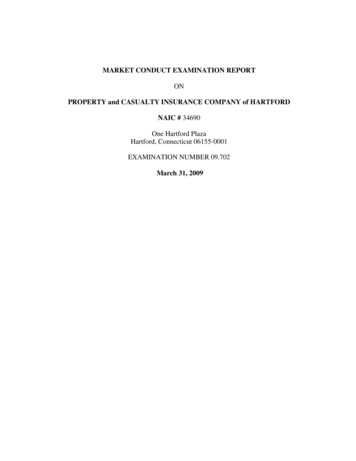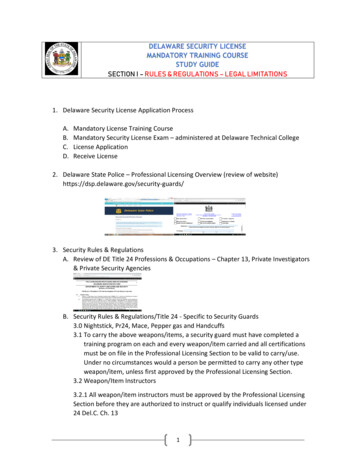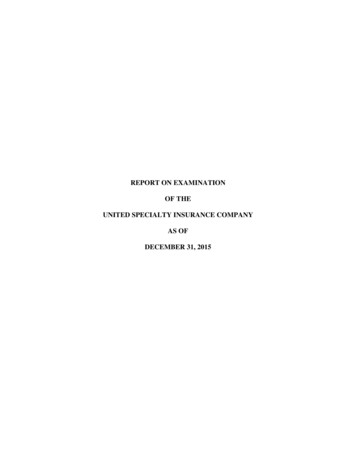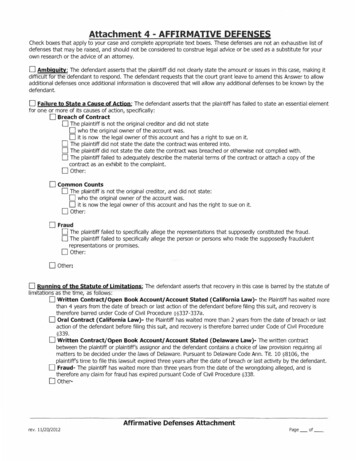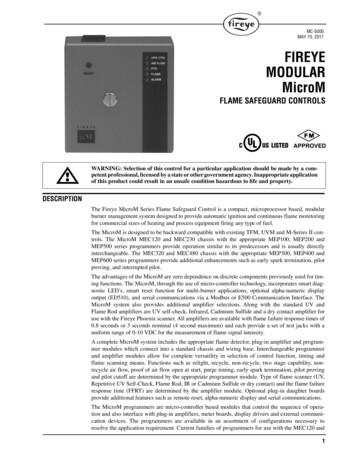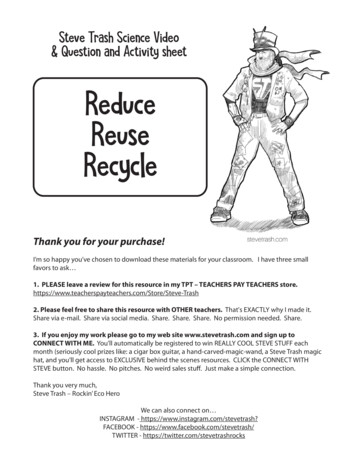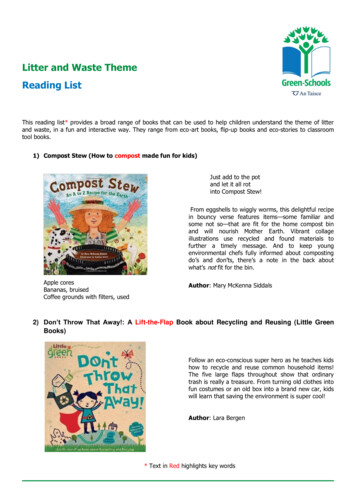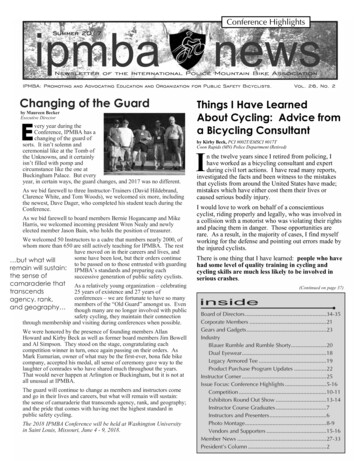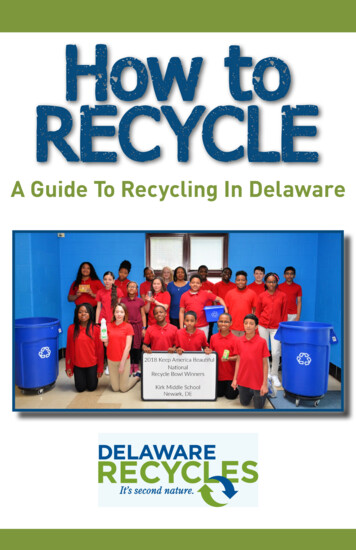
Transcription
How toRecycleA Guide To Recycling In DelawarePage 1
Table of ContentsRecycling in Delaware. 4Fellow Delawareans:Thanks directly to Delaware’s Universal Recycling Law, recycling is availableat home, work, school, and play. It’s now easier than ever to recycle. The statecurrently recycles about 44% of its municipal solid waste, making us a nationalleader in recycling. But our job is not done. Together, we can work to raise thatfigure to 60% – our recycling goal by 2020.A few key things to remember about universal recycling:1. Whoever collects your trash at your residence must include recycling as partof your waste service, and must provide you with a recycling container andcollection schedule. Recycling collection services are provided at least onceevery other week. Most Delawareans now recycle.2. Universal recycling makes it easy. All recyclable materials accepted cango directly into your recycling container – no sorting required. Many othermaterials and recyclable items can be recycled by dropping them off atrecycling centers or at special recycling events. Details can be found in thisguide.3. If you are in the commercial sector, such as a business, institution, propertymanagement or not-for-profit organization, the Universal Recycling Lawrequires you to actively participate in a comprehensive recycling program,and to keep recyclables out of your waste stream.Household Hazardous Waste. 6Electronic Goods Recycling. 8Yard Waste and Composting.10Recycling Reference Poster. 11Special Waste.15Frequently-asked Questions. 20More recycling in Delaware means we are using our resources more efficiently;that we can wait far longer before having to build more landfills, and that weare creating jobs in the recycling industry.Additional Resources.22Lastly, this updated “How to Recycle” in Delaware guide is a collaborationbetween our Department of Natural Resources and Environmental Control(DNREC) and the Delaware Solid Waste Authority (DSWA). We hope you’ll findit useful. Thank you in advance for recycling.Contact Information.23Sincerely,Governor John CarneyAbout Our Cover Photo:Kirk Middle School of Newark, Delaware was crowned national champion of theKeep America Beautiful Recycle-Bowl, the national recycling competition for K-12students, teachers and school communities. Kirk Middle School recycled 30.85pounds of materials per student during the competition. The school launched itsRecycle Club in 2012, under the direction of Helene Ross-Williams.Page 3
Recycling In DelawareRecycling containers and collection for residentsYour waste hauler or municipality will provide you with anadequately‑sized recycling container for the purpose of storage andcollection of recyclables. Recycling collection services will be provided atleast once every other week. Check with your waste hauler or your city/town office for available container options and collection schedules.Find a waste / recycling haulerA list of Delaware licensed waste haulers offering Universal Recycling can befound by visiting the Delaware Solid Waste Authority website at www.dswa.comor by calling DSWA at 800-404-7080. Waste haulers can provide you with wasteand recycling services, rates, and pick-up schedules. Call them if you have specificquestions about their services.Universal RecyclingFor questions about the Universal Recycling Law or the Universal RecyclingRegulations go to www.recycling.delaware.gov or call DNREC, Division of Wasteand Hazardous Substances at 302-739-9403.Commercial sector recyclingAll commercial sector entities are required to: actively participate in acomprehensive recycling program, identify recyclables and keep them separatefrom the solid waste stream, and ensure the recyclables are collected forrecycling.Page 4GARBAGEMIRRORSAND WINDOWGLASSTANGLERSGarden hoses,string lights,nylon rope, etc.SCRAPMETALPage 5
Household Hazardous WasteDSWA operates a Household Hazardous Waste (HHW) CollectionProgram free for all Delaware residents. Weekly events are held ineach county and weekend events are held throughout the year aroundDelaware. To find a current schedule of Household Hazardous Waste(HHW) events visit: www.dswa.com.Helpful tips: Bring materials in original, sealedcontainers. Do not mixproducts in one container.To prevent leakage or breakage,pack separately in absorbentmaterial or triple bag.Bring rags to clean up any spills,and dispose of rags at the collection site.What’s Not accepted at HHW collection events:You can bring the following items to a HHW collection event: Product containers marked with words, “Warning: Hazardous,”“Flammable,” “Poisonous,” “Corrosive” or “Explosive.” See belowfor listing. Household Items: Full aerosol cans, bleach, chemistrykits, nail polish, polish removers, perfumes,disinfectants, drain cleaners, floor wax, mercurythermometers, moth balls, oven cleaner, spotremover, toilet cleaner, fluorescent light bulbs andcompact fluorescent light bulbs. Explosives: Ammunition, firecrackers, gunpowderEXPLOSIVES NOT ACCEPTED at Weekly Collection Events or1st Saturday Event at Delaware Recycling Center Workshop Items: Corrosives, paints, smallcompressed-gas cylinders, solvents, stains,strippers, thinners, varnish, woodpreservatives, fluorescent bulbs *Friable asbestos: Disposal by appointment only at CherryIsland Landfill for a fee. Call 302-764-5385 for details. Non-friable asbestos: Accepted by appointment at all DSWAlandfills for a fee. Unknown substances: Unknown items that are greater than 1gallon or 8 pounds. Radioactive waste Cooking Oil Prescription medication: DO NOT FLUSH! Please turn to page 18for information about disposing of perscription medication*The hazardous friable asbestos is material which can be crumbled,pulverized, or reduced to powder by hand pressure. This may includepreviously non-friable material which become broken or damaged bymechanical force; example: ceiling tiles. Yard/Garden Items: Fungicides, herbicides,pesticides, pool chemicals Automotive Materials: Antifreeze, auto batteries,Page 6Page 7
Electronics RecyclingDSWA has an electronics recycling program available to residents, schools,non-profit groups, and public agencies. Recycling electronic goods removespotentially hazardous materials from the waste stream and saves landfillspace. Many retail stores that sell electronics may offer EGR take-backprograms.Some components of these electronic devices may contain pieces thatif improperly handled could be harmful to the environment. Certaincomponents may contain small amounts of lead, silver, barium, cadmium,and mercury. Many of these metals can be recovered and recycled byde-manufacturing and recycling of electronic devices.Drop-off locations for EGRDSWA provides drop-off locations for electronics recycling in each county, aswell collection during special Saturday events. For information on collectionlocations and schedules visit: www.dswa.com.Acceptable electronics for recycling:Computer components and/or partsPersonal computersMonitorsMain frame computersKeyboardsMini computersMiceTerminalsCablesPrintersLaptop computersNotepad computersCopying equipmentNotebook computersCalculatorsElectronic typewritersTelecommunications equipmentTelephone systemsTerminalsTelephonesTelexFacsimilePay telephonesCordless telephonesCellular telephonesAnswering machinesRadio, television, electro acoustic radiosTelevisionsVideo camerasVideo recordersTape recordersAudio amplifiersVcrsCassette playersRecord playersRadiosDvd playersSmall household appliancesMicrowave ovensHand‑held game systemsElectronic toysPage 8Vacuum cleanersVideo game systemsPage 9
Yard Waste and CompostingYard Waste is plant material resulting from lawn maintenance,gardening and landscaping activities and includes; grass,leaves, prunings, brush, shrubs, garden materials, Christmastrees, and tree limbs up to 4 inches in diameter. Thesematerials are valuable ingredients for the generation ofmulch and compost and cannot be disposed of in your trashor in any DSWA landfill, outside of the designated yard wastearea at the landfill.Management options:PosterUse this poster as a quick reference guide forwhat to place in your single stream recyclingcarts. Please place all items loose - notbagged - in your recycling cart to allow foreasy collection and processing. Grasscycle by using a mulching lawn mower orpurchase an inexpensive mulching blade andleave grass clippings on your lawn as free naturalfertilizer. Manage your yard waste and food scraps ascompost on your own property Take your yard waste to a drop-off facility. Hire a service to collect your yard waste. For more information on yard waste recycling, composting,and management options: www.recycling.delaware.gov or visitwww.dswa.comPage 10Page 11
GARBAGEMIRRORSAND WINDOWGLASSTANGLERSGarden hoses,string lights,nylon rope, etc.SCRAPMETAL
Additional ResourcesEducationKeep DE Litter FreeDelaware Solid Waste Authority Education Building: Educationprograms focus on recycling and reliable solid waste managementpractices. For questions or to schedule a field a trip contact DSWA’sPublic Education Outreach Technician, at 1-800-404-7080, or online at:www.dswa.com.In partnership with Keep Delaware Beautiful, Delawarehas launched a statewide campaign to encourageDelawareans to not litter, to clean up public spaces, andprotect Delaware’s unique natural heritage.A 2018 study from Keep Delaware Beautiful and the Stateof Delaware identified more than 6,000 pieces of litter forevery mile of roadway surveyed. Not surprisingly, cigarettebutts, plastic bags, aluminum cans, and glass bottlesaccounted for a significant percentage of the roadwaytrash.HOW CAN YOU HELP? Most importantly, don’t litter! And encourage family members, friends andcolleagues to help “Keep DE Litter Free” by taking the pledge at de.gov/litterfree. Share the pledge on your social media and post using #KeepDELitterFree.Waste Stream AssessmentsDNREC offers free waste assessments for your school, business, ornot-for-profit organization. Staff will conduct a qualitative analysis ofyour waste stream and waste management practices and offer helpfulrecommendations. The assessment will include information aboutwaste reduction, reuse, recycling, and composting. Participate in a cleanup: Find an event at: de.gov/litterfree.Keep Delaware BeautifulKeep Delaware Beautiful was formed in 2016 with thepurpose of fostering and promoting Keep AmericaBeautiful programs focused on litter prevention,community beautification and minimizing the impactof solid waste in the State of Delaware.About Keep America BeautifulContact the Department of Natural Resources and EnvironmentalControl, Division of Waste and Hazardous Substances at 302-7399403 for more information or visit Delaware Recycles, online at:www.recycling.delaware.govPage 14Keep America Beautiful, the nation’s iconic community improvement nonprofitorganization, inspires and educates people to take action every day to improveand beautify their community environment. Celebrating its 65th Anniversaryin 2018, Keep America Beautiful strives to End Littering, Improve Recycling andBeautify America’s Communities. We believe everyone has a right to live in a clean,green and beautiful community, and shares a responsibility to contribute to thatvision.For more information on Keep Delaware Beautiful, visitwww.KeepDelawareBeautiful.comPage 15
Special WasteSpecial waste can be defined as any waste material whose physicalcharacteristics or chemical makeup may require special handlingprocedures, which may pose an unusual threat to human health,equipment, property, or the environment. While most special wastecan be disposed of in landfills, it is preferable to keep these materialsseparate from regular trash and recycled through one of thefollowing programs: Battery recycling (see page 16)Compact fluorescent bulbs (CFL) (see page 6 and 17)Construction and demolition debris (see page 16)Ink and toner cartridges (see page 17)Appliances (see page 19)Prescription medication (see page 18)Scrap tires (see page 19)Styrofoam (see page 19)Clothing and household goods (see page 17)Motor oil and filters (see page 19)Appliances (see page 19)Construction and demolition debrisAbout 80 percent of mixed construction waste can be recovered throughrecycling. Materials that are typically accepted at construction and demolitionrecycling facilities may include: cardboard, carpet, ceiling tiles, concrete, drywall,pallets, paper, plastic, rubble, scrap metal, shingles, and wood. For more information see: www.revolutionrecovery.com/ or call 302-356-3000.For demolition and remodeling, builders and homeowners can identify materialsthat can be reused or salvaged for donation or resale. Donate or purchaseconstruction materials at a Habitat for Humanity Restore. Restores are located inKent, Sussex, and New Castle Counties.CFL (Compact fluorescent bulbs)Battery recyclingHousehold alkaline and rechargeable batteries can be recycledat DSWA drop off centers. Lead-acid batteries can be recycled atbusinesses that sell or replace vehicle or boat batteries. Batteriescan also be dropped off at a DSWA Household Hazardous WasteEvent. To find the nearest DSWA drop-off center or for informationabout special HHW Collection events please visit: www.dswa.comor call (800)-404-7080.CFL bulbs may be returned to most home improvement stores for recycling orbrought to a Delaware Solid Waste Authority Household Hazardous Waste weeklyor weekend event (see page 6 for more information).Ink and toner cartridgesContact an office or electronics store for recycling option services. Some retailersand suppliers offer take-back programs and may provide toner cartridge collectionboxes for your office or school.Clothing and household goodsReusable clothing, furniture, small appliances, toys,and building materials can be donated to charity orpurchased for reusePage 16Page 17
SpecialWasteSpecialWastePrescription medicationDO NOT FLUSHUnused portions of medicines must be disposed of properly to avoid harm.Permanent medication collection boxes are available in Delaware for safedisposal. A list of these locations can be found at www.dswa.comScrap tiresScrap tire piles present a number ofenvironmental, health, and safety hazards toour communities. For one, they are an idealbreeding ground for mosquitoes. DNREC’sScrap Tire Management Program registersscrap tire piles and implements a cleanupprogram for scrap tire piles that numbermore than 100 tires and were in existenceon June 30, 2006. For more information please call DNREC’s Division of Wasteand Hazardous Substances at 302-739-9403.Residents may also bring up to 4 tires to DSWA Landfills and Transfer Stationat the regular disposal rate. For more information visit www.dswa.comStyrofoamStyrofoam is not accepted in curbside recycling butDSWA has partnered with DART Container to providecollection of Styrofoam at specific DSWA recyclingdrop-off centers. Acceptable items include cleanfoodservice products such as foam cups, foam plates,foam egg cartons, as well as foam protective packagingtypically used to protect consumer goods and electronics. Visit: www.dswa.comThe Drug Enforcement Administration (DEA) will accept unused or expiredmedication for safe disposal at the National Prescription Drug Take Back Event.For more information on Drug Take Back Programs and permanent prescriptiondrug drop off locations, please visit HelpIsHereDE.comMotor oil and filtersOil which has not been mixed with other fuelsis accepted at specific DSWA recycling drop-offcenters, visit: www.dswa.com to locate a centernear you.AppliancesAppliances such as air conditioners,refrigerators, dishwashers, freezers, washers,dryers, and water heaters can be recycled atDSWA landfills or transfer stations for a fee.Visit www.dswa.com for more informationor call 800-404-7080.Page 18Page 19
Frequently-asked questions (FAQ)Question: What are the requirements imposed on waste collectors – eitherprivate hauling companies or municipalities – by Delaware’s universalrecycling law?Answer: Under Delaware’s universal recycling law,waste collection service in Delaware, whetherprovided by a municipality or a commercialhauling service, will consist of (1) removal of trashfor disposal in landfills and (2) collection of singlestream recyclable items. Single stream recycling isa system where all traditional recyclables can be stored, collected, and placedloose in the same container - no bags please. Universal recycling started withsingle-family homes as well as restaurants and bars in September 2011, and wasfollowed by multifamily homes, like apartments, in January 2013, and then allcommercial businesses are required to participate in recycling by January 2014.Q: Is recycling required in the commercial sector?A: Yes. All commercial sector entities are required to actively participate ina comprehensive recycling program, identify recyclables and keep themseparate from the solid waste stream, and ensure the recyclables are collectedfor recycling. Commercial sector means any for-profit or not-for-profit retailor wholesale stores, offices, food service establishments, hospitality, utility,warehouses, and other manufacturing, industrial or processing activities, andinstitutions such as social, charitable, educational, healthcare, professional andgovernment services. Property managers in the single and multi-family residential sectors, and in the commercial sector shall ensure that recycling servicesare available for tenants in a manner that is convenient. Property managers, ata minimum, are to provide annual notification to their tenants that recyclingservices are provided with instructions on participation.Q: What happens to my recyclables?A: Most recyclables collected in Delaware are dropped off at a DSWA transferstation and then taken to a materials recovery facility (MRF) located in Delaware,for processing. The materials are separated, baled, and marketed by theprocessor.Q: Where can I find a DSWA drop-off center?A: DSWA continues to operate drop-off centers and hold weekly and weekendhousehold hazardous waste, electronics good collection, and paper shreddingevents. For more information visit: www.dswa.com or call 800-404-7080.Page 20Q: Why is universal recycling in the best interest of Delawareans?A: Landfills in all three counties have had to undergo expansions thatare costing residents and businesses tens of millions of dollars peryear in higher disposal costs. Increased recycling saves land as wellas reduces the cost of developing new landfill space in the future.Recycling also supports job creation through the collection andprocessing of recyclables and in the manufacturing of new productsfrom the recycled materials. And the most efficient system for recycling– and the one that is the lowest cost for everyone – is the system inwhich everyone participates, hence the requirement that all wastehaulers provide recycling services to their customers and the commercial sector requirement of participation in a comprehensive recyclingprogram.Q: Why ban yard waste from landfills?A: Yard waste is a significant portion of the waste we discard and it iseasily recyclable. Saving landfill space will help keep disposal costsdown. Managing yard waste creates valuable products such as mulchor compost that are in demand for a wide variety of uses. Many outletsexist to recycle yard waste and individuals can even recycle it on theirown property. We do not want to continue landfilling yard waste whileimporting mulch and compost products from other states.Q: Why should I recycle electronic goods?A: Some components of these electronic devices may contain piecesthat if improperly handled could be harmful to the environment andto human health. Certain components may contain small amountsof lead, silver, barium, cadmium, and mercury. Many of these metalscan be recovered and recycled by de-manufacturing and recycling ofelectronic devices.Q: Why can’t I include plastic bags in my single stream recycling?A: All plastic bags are problematic during the processing of recyclablesbecause they get tangled around the moving parts at the materialrecovery facility (MRF). Place your recyclables loose – no bags – in yourrecycling cart or dumpster. Plastic grocery bags and plastic films thatare clean and dry can be recycled at most large retailers in Delaware.Page 21
Additional ResourcesEducationKeep DE Litter FreeDelaware Solid Waste Authority Education Building: Educationprograms focus on recycling and reliable solid waste managementpractices. For questions or to schedule a field a trip contact DSWA’sPublic Education Outreach Technician, at 1-800-404-7080, or online at:www.dswa.com.In partnership with Keep Delaware Beautiful, Delawarehas launched a statewide campaign to encourageDelawareans to not litter, to clean up public spaces, andprotect Delaware’s unique natural heritage.A 2018 study from Keep Delaware Beautiful and the Stateof Delaware identified more than 6,000 pieces of litter forevery mile of roadway surveyed. Not surprisingly, cigarettebutts, plastic bags, aluminum cans, and glass bottlesaccounted for a significant percentage of the roadwaytrash.HOW CAN YOU HELP? Most importantly, don’t litter! And encourage family members, friends andcolleagues to help “Keep DE Litter Free” by taking the pledge at de.gov/litterfree. Share the pledge on your social media and post using #KeepDELitterFree.Waste Stream AssessmentsDNREC offers free waste assessments for your school, business, ornot-for-profit organization. Staff will conduct a qualitative analysis ofyour waste stream and waste management practices and offer helpfulrecommendations. The assessment will include information aboutwaste reduction, reuse, recycling, and composting. Participate in a cleanup: Find an event at: de.gov/litterfree.Keep Delaware BeautifulKeep Delaware Beautiful was formed in 2016 with thepurpose of fostering and promoting Keep AmericaBeautiful programs focused on litter prevention,community beautification and minimizing the impactof solid waste in the State of Delaware.About Keep America BeautifulContact the Department of Natural Resources and EnvironmentalControl, Division of Waste and Hazardous Substances at 302-7399403 for more information or visit Delaware Recycles, online at:www.recycling.delaware.govPage 22Keep America Beautiful, the nation’s iconic community improvement nonprofitorganization, inspires and educates people to take action every day to improveand beautify their community environment. Celebrating its 65th Anniversaryin 2018, Keep America Beautiful strives to End Littering, Improve Recycling andBeautify America’s Communities. We believe everyone has a right to live in a clean,green and beautiful community, and shares a responsibility to contribute to thatvision.For more information on Keep Delaware Beautiful, visitwww.KeepDelawareBeautiful.comPage 23
Cape Henlopen State Park, Photo Credit: Terri LottmannCONTACT US:Delaware Recycles, online at: www.recycling.delaware.govDelaware Solid Waste Authority, 1-800-404-7080 or online at: www.dswa.com
GLASS GARBAGE. Page 6 Page 7 Household Hazardous Waste DSWA operates a Household Hazardous Waste (HHW) Collection Program free for all Delaware residents. Weekly events are held in each county and weekend events are held throughout the year around Delaware. To find a current schedule of Household Hazardous Waste
